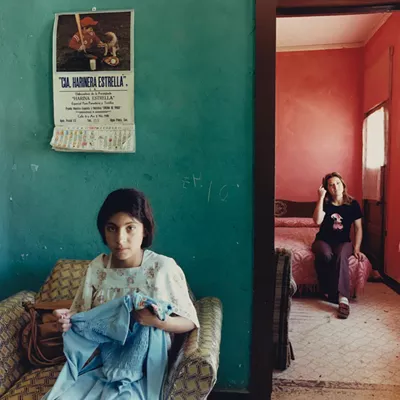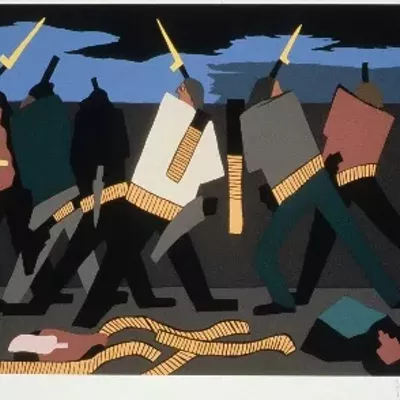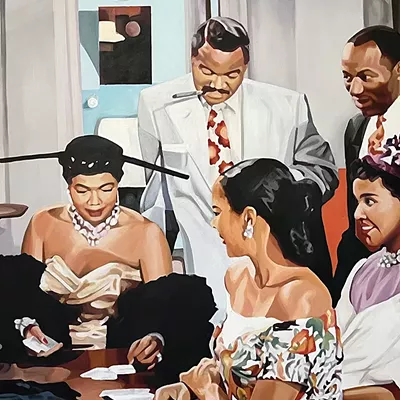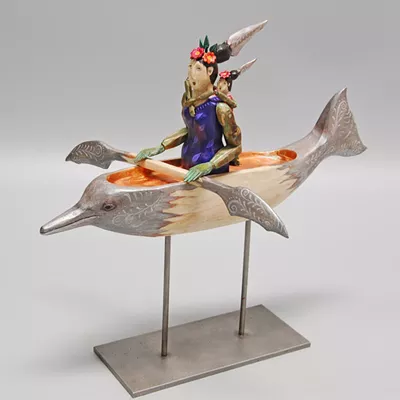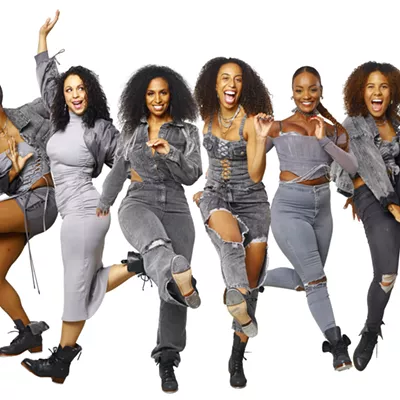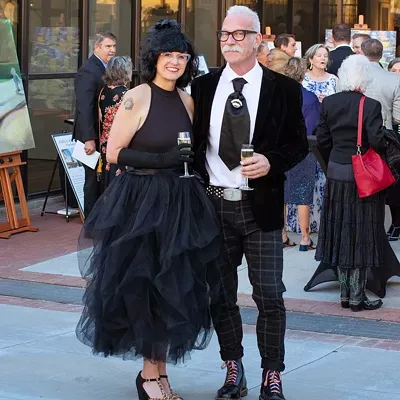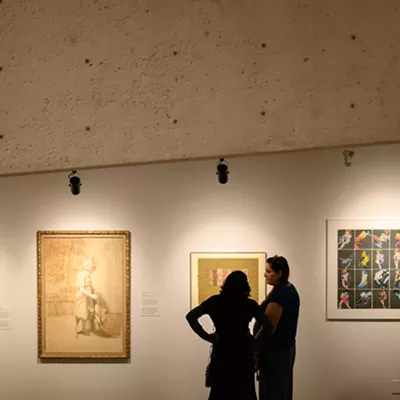Bisbee artist Laurie McKenna knew for a long time that she wanted to make work commemorating the Bisbee Deportation of 1917.
A conceptual artist and executive director of Bisbee's Central School Project art space, McKenna had created works about injustice before, notably her multimedia Rock Paper Fence about Border Patrol violence.
And the notorious Bisbee Deportation had happened on her own turf. On July 12, 1917, up to 1,196 striking miners and their supporters were rounded up at gunpoint in the copper-mining town by "deputies" of the sheriff, loaded onto railroad boxcars and tossed out into the New Mexico desert at the height of the summer heat.
Two years ago, she started developing ideas for her piece and working with other historically minded members of the Bisbee community to collaborate on programing. Then, last year, the presidential race erupted in all its ugly fury.
"Once it was 2016, I got even more committed," she said by phone last week from her studio. "The Trump campaign exposed a feverish, anti-immigrant sentiment. The campaign was building hyper-patriotism as a means of exclusion," which paralleled the run-up to the Bisbee Deportation.
"World War I fervor and patriotism were used to justify what happened," she says. "They just threw people away. They called them the Undesirables."
McKenna started pasting posters on walls around town, giving people hints about the upcoming 100th anniversary. She also got busy on social media, posting about labor history on Facebook and Twitter, and she commissioned pamphlets on the kidnapping from three writers with different perspective.
On Friday night next week, she'll debut an installation and perform a piece she calls a Gallery Rally, both part of the multi-media project named, naturally, "The Undesirables". The installation features no fewer than 1,196 hand rubbings of a 1917 penny, each one appearing on a separate piece of paper and emblazoned with a striker's name. More than 300 are labeled "unknown," honoring the workers whose names are lost to history.
And she hopes to introduce her "penny press," crafted for her by Andrew Fairbank of New Hampshire, and reminiscent of the penny presses at tourist attractions. Put a penny in and the press will make one of four different deportation images created by McKenna. .
McKenna's project is not the only one. She and other Bisbee residents have put together a whole array of art, scholarly and historical events to mark the centennial. The events got rolling a month ago, but the next 10 days are thick with deportation fervor. Acting wannabes can be in a film documentary, and singers, dancers and poets can perform at an open-stage evening. Plenty of authors and scholars will be giving talks. Everything is free, with the exception of admission to the Bisbee Mining & Historical Museum. And don't forget: the mile-high city of Bisbee is always cooler than Tucson.
Events
Saturday, July 8. Author Jane Little Botkin talks about her new book, Frank Little and the IWW: The Blood That Stained an American Family (University of Oklahoma Press, 2017). Botkin is a great-grandniece of Little, a union organizer who was lynched and murdered in the mining town of Butte, Montana, just weeks after the Bisbee Deportation. 2 p.m., Bisbee Mining and Historical Museum, 5 Copper Queen Plaza. 520-432-7071.
Monday, July 10. Robert Houston, a retired creative writing prof at the UA and author of many novels, talks about Bisbee '17, his fictional account of the deportation (University of Arizona Press, 1999). 5:30 p.m., Copper Queen Library, 6 Main St. 520-432-4232.
Tuesday, July 11. The Mexican Revolution. Rebecca Orozco, a historian who teaches at Cochise College and the UA, discusses the Mexican conflict that raged before, during and after the deportation. 5:30 p.m. Copper Queen Library, 6 Main St. 520-432-4232.
Wednesday, July 12. On the 100th anniversary day, the 4th Row Films documentary film crew is shooting a re-creation of the roundup of miners and their forced march. Anyone who wants to be in the movie should show up in plain clothes, either light or dark. 7 a.m. to 5 p.m. at Copper Plaza downtown; onlookers welcome. For info contact Katie Schnell at katieschnell5@gmail.com.
Wednesday, July 12. Deportation Remembrance. Non-denominational service takes place at 5 p.m. at St. John's Church, 19 Sowles Ave. 520-432-7006
Wednesday, July 12. "The Deportation: Bisbee Responds," an open stage evening welcomes anyone who wants to sing, recite, read or dance. 7 p.m. Central School Project, 43 Howell Ave. 520- 432-4866. Contact Chris Dietz at dietzfamily@cableone.net.
Friday, July 14. "The Undesirables," an installation and Gallery Rally by artist Laurie McKenna begins at 7 p.m. Open for viewing on weekend days through July. Central School Project, 43 Howell Ave. Call 520-432-4866 for hours.
Saturday, July 15. "100 Years of History: The Deportation Symposium," moderated by Prof. Orozco, will feature two scholarly speakers, Dr. Katherine Benton-Cohen and Dr. William Beezley, and a panel discussion with four Bisbee local history experts. 10 a.m. to 3 p.m. at the Bisbee Royale, 94 Main St. Food and drink for sale. 520-227-6547.
Dr. Benton-Cohen, Arizona native and associate professor of history at Georgetown, is the author of Borderline Americans: Racial Division and Labor War in the Arizona Borderlands (Harvard University Press, 2009), a book that looks at the Bisbee Deportation in the context of the complicated racial history of Cochise County—and of the U.S. as a whole.
Dr. Beezley, history prof at the UA, is the author more than a dozen books, including A Companion to Mexican History and Culture (Wiley-Blackwell, 2011). A frequent guest on the PBS show In the Americas, he recently received the Ohtli Award for his years of teaching and promoting Mexican culture.
Sunday, July 16. 4th Row Films continues its filming at Warren Ballpark, where participants will be loaded into boxcars, just as the miners were. 9 a.m. to 6 p.m. For info, contact katieschnell5@gmail.com.
Sunday, July 16. The Loft Cinema will screen An Injury to One, a 2011 documentary by Travis Wilkerson about the murder of union organizer Frank Little. 7:30 p.m. at the Central School Project.
Tuesday, July 18. Bisbee's Forgotten Men, Part Two. Local historian Mike Anderson shares his research on the fates of the banished miners. 5:30 p.m., Copper Queen Library.
Bisbee Deportation: The Visual Story is on view at the Bisbee Mining & Historical Museum. Open daily 10 a.m. to 4 p.m. $10 general; $7 seniors 60 and up; $3 children 15 and under. Free admission during July and August (for Bisbee residents only). 5 Copper Queen Plaza

